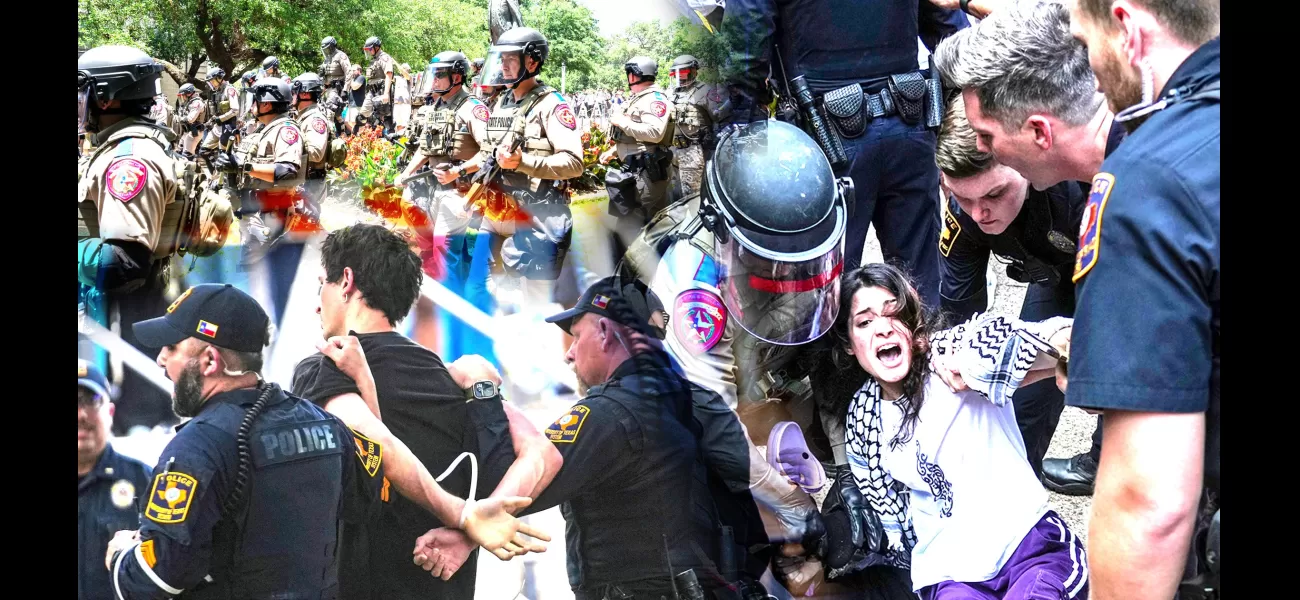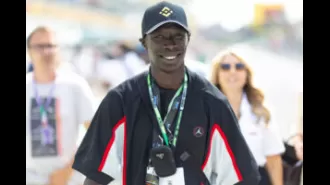US college students detained for demonstrating in support of Palestine.
Students have mostly protested war peacefully, but some have turned violent.
April 30th 2024.

In recent days, there has been a noticeable increase in crackdowns on protests all over the United States. One particular issue that has been driving these demonstrations is the ongoing conflict between Israel and Hamas. Across the country, universities have become hotspots for students to voice their opposition to the war and demand action from their institutions.
Today, at Columbia University in New York, things took a more intense turn as students barricaded a building on campus. This only added fuel to the already tense situation as these students demanded that the university cut all financial ties with Israel. While most of the protests by students have been peaceful, there have been some instances where things have turned chaotic.
At the University of Texas, for example, riot police were forced to use pepper spray and arrest dozens of students. Texas state governor Greg Abbott made it clear that no encampments would be allowed. These demonstrations have been going on for months as students strive to stop their universities from supporting Israel and to protest against US funding for Israeli weapons. Some have even drawn parallels to the Vietnam War protests of the 1970s, which ultimately led to the end of combat operations in Vietnam and a suspension of the draft. Could these current protests have a similar impact?
The protests began in October of last year and have since spread across the country. At Columbia University, students linked arms to prevent police officers from entering the barricaded building. This has become a regular occurrence on American university campuses, but the scale of these demonstrations has increased significantly in the past month.
Things reached a boiling point when the New York City Police Department entered the student encampment at Columbia University and made mass arrests on April 17th. In response, other universities on the East Coast, such as New York University, Emerson College, MIT, Yale, and Tufts, also began encampment protests. These demonstrations have even spread overseas, with students in Paris being dragged away in handcuffs during a protest last week.
The main demands of these student protestors vary slightly, but they all agree that the US should end its military support for Israel. Some, like the students at Columbia, are calling for their schools to cut all financial ties with Israel and any companies directly involved in the conflict. The mass arrests that have taken place have also sparked calls for amnesty for students and faculty who have faced disciplinary action for their participation in the protests.
There have also been counter-protests by those who support Israel, such as the pro-Israel rallies held near the encampment at Columbia University. One pro-Israel demonstrator, Leat Corinne Unger, shared her personal connection to the conflict as she spoke of her cousin being held hostage in Gaza for over 200 days. She expressed her frustration and heartache, but also acknowledged the suffering of others in the situation.
So why have students been getting arrested? As universities try to prevent these demonstrations from disrupting campus life, some protestors have been arrested for causing disturbances. Reasons for arrest have ranged from criminal trespass for camping overnight on campus to disciplinary action taken by universities, including suspension, probation, and even expulsion. In one extreme case, an economics professor at Emory University was charged with battery after a video showed her being forcefully arrested during a protest.
Many have drawn comparisons between these current protests and the famous anti-war demonstrations of 1968, which also began at Columbia University. However, statistics show that these events have been handled very differently. In 1968, there were only 300 protestors on the first day, compared to over 100 in 2024 at Columbia University. Police were called on the seventh day of the 1968 protests, but this year, they were called after just two days.
There have also been accusations of anti-Semitism during these protests, with reports of clashes between pro-Palestinian and pro-Israeli demonstrators. One student at Columbia, Kymani James, was even barred from campus after a video surfaced of him making a controversial statement. These tensions have only added to the already charged atmosphere on campus.
Today, students at Columbia University took over a building and renamed it Hind Hall, in honor of a 6-year-old Palestinian girl who tragically lost her life during the conflict. In a statement, the students described this action as the next generation of movements that have taken place at their university, such as the Vietnam War protests. Despite these demonstrations, Columbia University President Minouche Shafik has stated that the university will not divest from Israel, but has offered a timeline to review proposals from the students.
But the protests continue. Just this morning, police arrested 30 pro-Palestinian protestors at the University of North Carolina, despite a letter from the interim chancellor and provost warning of consequences for failure to disperse. At the Paris Institute of Political Studies, French students have also barricaded themselves in a campus building in solidarity with their American counterparts.
Hicham, a master's student at the Paris Institute, stressed the importance of universities in the ongoing conflict and the need for action. He also noted that these protests have been gaining support from other universities around the world. It is clear that these students are determined to make their voices heard and to bring attention to the ongoing crisis in the Middle East.
Today, at Columbia University in New York, things took a more intense turn as students barricaded a building on campus. This only added fuel to the already tense situation as these students demanded that the university cut all financial ties with Israel. While most of the protests by students have been peaceful, there have been some instances where things have turned chaotic.
At the University of Texas, for example, riot police were forced to use pepper spray and arrest dozens of students. Texas state governor Greg Abbott made it clear that no encampments would be allowed. These demonstrations have been going on for months as students strive to stop their universities from supporting Israel and to protest against US funding for Israeli weapons. Some have even drawn parallels to the Vietnam War protests of the 1970s, which ultimately led to the end of combat operations in Vietnam and a suspension of the draft. Could these current protests have a similar impact?
The protests began in October of last year and have since spread across the country. At Columbia University, students linked arms to prevent police officers from entering the barricaded building. This has become a regular occurrence on American university campuses, but the scale of these demonstrations has increased significantly in the past month.
Things reached a boiling point when the New York City Police Department entered the student encampment at Columbia University and made mass arrests on April 17th. In response, other universities on the East Coast, such as New York University, Emerson College, MIT, Yale, and Tufts, also began encampment protests. These demonstrations have even spread overseas, with students in Paris being dragged away in handcuffs during a protest last week.
The main demands of these student protestors vary slightly, but they all agree that the US should end its military support for Israel. Some, like the students at Columbia, are calling for their schools to cut all financial ties with Israel and any companies directly involved in the conflict. The mass arrests that have taken place have also sparked calls for amnesty for students and faculty who have faced disciplinary action for their participation in the protests.
There have also been counter-protests by those who support Israel, such as the pro-Israel rallies held near the encampment at Columbia University. One pro-Israel demonstrator, Leat Corinne Unger, shared her personal connection to the conflict as she spoke of her cousin being held hostage in Gaza for over 200 days. She expressed her frustration and heartache, but also acknowledged the suffering of others in the situation.
So why have students been getting arrested? As universities try to prevent these demonstrations from disrupting campus life, some protestors have been arrested for causing disturbances. Reasons for arrest have ranged from criminal trespass for camping overnight on campus to disciplinary action taken by universities, including suspension, probation, and even expulsion. In one extreme case, an economics professor at Emory University was charged with battery after a video showed her being forcefully arrested during a protest.
Many have drawn comparisons between these current protests and the famous anti-war demonstrations of 1968, which also began at Columbia University. However, statistics show that these events have been handled very differently. In 1968, there were only 300 protestors on the first day, compared to over 100 in 2024 at Columbia University. Police were called on the seventh day of the 1968 protests, but this year, they were called after just two days.
There have also been accusations of anti-Semitism during these protests, with reports of clashes between pro-Palestinian and pro-Israeli demonstrators. One student at Columbia, Kymani James, was even barred from campus after a video surfaced of him making a controversial statement. These tensions have only added to the already charged atmosphere on campus.
Today, students at Columbia University took over a building and renamed it Hind Hall, in honor of a 6-year-old Palestinian girl who tragically lost her life during the conflict. In a statement, the students described this action as the next generation of movements that have taken place at their university, such as the Vietnam War protests. Despite these demonstrations, Columbia University President Minouche Shafik has stated that the university will not divest from Israel, but has offered a timeline to review proposals from the students.
But the protests continue. Just this morning, police arrested 30 pro-Palestinian protestors at the University of North Carolina, despite a letter from the interim chancellor and provost warning of consequences for failure to disperse. At the Paris Institute of Political Studies, French students have also barricaded themselves in a campus building in solidarity with their American counterparts.
Hicham, a master's student at the Paris Institute, stressed the importance of universities in the ongoing conflict and the need for action. He also noted that these protests have been gaining support from other universities around the world. It is clear that these students are determined to make their voices heard and to bring attention to the ongoing crisis in the Middle East.
[This article has been trending online recently and has been generated with AI. Your feed is customized.]
[Generative AI is experimental.]
0
0
Submit Comment





